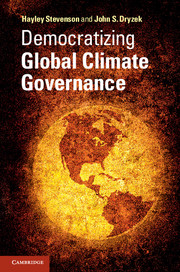Book contents
- Frontmatter
- Contents
- List of Tables
- Preface
- Acknowledgments
- List of Acronyms
- 1 The challenge of global climate governance
- 2 Global climate governance as a deliberative system
- 3 Governance with and without institutionalized authority
- 4 Authoritative global governance
- 5 Emerging centers of networked authority
- 6 Transmitting public concerns in the deliberative system
- 7 Accountability
- 8 Improving the global deliberative system
- 9 Conclusion
- References
- Index
1 - The challenge of global climate governance
Published online by Cambridge University Press: 05 June 2014
- Frontmatter
- Contents
- List of Tables
- Preface
- Acknowledgments
- List of Acronyms
- 1 The challenge of global climate governance
- 2 Global climate governance as a deliberative system
- 3 Governance with and without institutionalized authority
- 4 Authoritative global governance
- 5 Emerging centers of networked authority
- 6 Transmitting public concerns in the deliberative system
- 7 Accountability
- 8 Improving the global deliberative system
- 9 Conclusion
- References
- Index
Summary
Our end in view in this book is global climate governance that is both more democratic and more effective than what we currently observe. We will conclude with some substantial claims about how democratic governance – in particular, deliberative democratic governance – can be promoted in a way that will also render the world better able to face the multiple challenges of climate change. These claims are grounded in our analysis and evaluation of existing mechanisms of climate governance. So while eventually we turn to prescription, we spend most of our time on elucidating the elements of global climate governance and taking a hard look at their qualities and deficiencies. In this first chapter we begin by contemplating the nature of the challenge that climate change presents, and set the scene for our own response to it.
The recognition of climate change and the rise of climate governance
In 1896 the Swedish scientist Svante Arrhenius argued that increasing carbon dioxide concentrations in the global atmosphere resulting from the combustion of fossil fuels would eventually have the potential to increase average global temperatures, though he thought it would be hundreds if not thousands of years before much could be discerned. A century and more of ever-increasing greenhouse gas concentrations (not limited to carbon dioxide) have demonstrated that his conjecture was essentially right, though his timescale was a bit off, for the effects of climate change started to become apparent in the late twentieth century. Eventually governments started to take notice. As early as 1965 the US President’s Science Advisory Committee suggested that climate change could be making itself felt by 2000.
- Type
- Chapter
- Information
- Democratizing Global Climate Governance , pp. 1 - 11Publisher: Cambridge University PressPrint publication year: 2014



